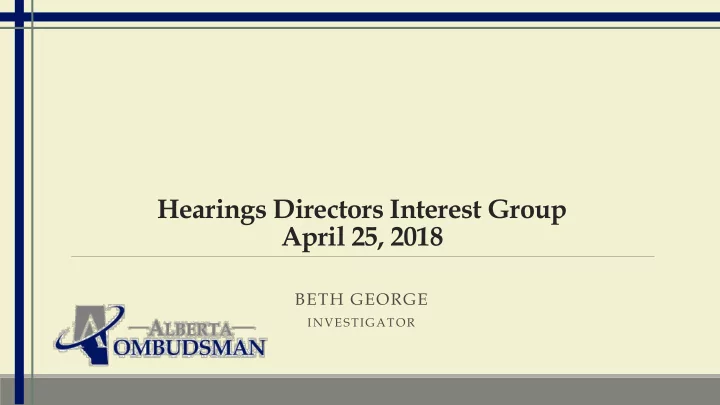

Hearings Directors Interest Group April 25, 2018 BETH GEORGE INVESTIGATOR
Overview • Introduction • Administrative Fairness Guidelines • Common Issues • Recommendations • Resources
Introduction • The administrative fairness guidelines help explain how our office investigates complaints of unfair treatment. • Administrative decisions that affect the rights, privileges or interests of an individual trigger a “duty of fairness.” • Natural justice is to administrative fairness what due process is to criminal law.
Administrative Fairness Guidelines 1. Chain of legislative 5. Apprehension of bias authority 6. Legitimate expectations 2. Duty of fairness 7. Exercising discretionary 3. Participation rights power 4. Adequate reasons 8. Was the decision reasonable?
1.Chain of Legislative Authority • Trace the chain of legislative authority. • What legislation and regulation creates the authority or power to make a decision? • How is this translated to applicable policies, guidelines, code of ethics, standards of practice? • Did the College follow the legislated rules?
2. Duty of Fairness • We look for a meaningful review process • Did the individual have an opportunity to present arguments and be heard? • The more final, binding, and impactful a decision is, the greater the procedural protections must be. • Key details to administer complaints are outlined in the Health Professions Act
3. Participation Rights • Parties should have a full and fair opportunity to present their case to a decision-maker. • Fully informed of the case against them and having a fair opportunity to present a defense or rebuttal. • Under the HPA participation rights extends to both the complainant and the investigated member (e.g. submissions can be written or oral or both [section 68(4)]
4. Adequate Reasons • Is there a rational connection between the evidence presented and the conclusions reached by the decision-maker? • Has a clear explanation been provided as to how legislation, regulation or standards of practice was applied to the individual’s circumstances? • Are the reasons written so a reasonably informed person can understand them? • If evidence was rejected were reasons provided as to why? How was evidence weighed? • Were all major arguments addressed?
5. Apprehension of Bias • Is there a relationship between the decision-maker and the parties in a case? • Is the decision-maker impartial and independent? • Does any other potential conflict of interest exist? • Decision-makers should guard against forming opinions about the case before reviewing the documentation and hearing from all parties.
6. Legitimate Expectations • Did the decision-maker make a commitment that a certain procedure would be followed? • Did the authority follow its regular process or deviate from it? • May be as simple as an official failing to follow through after agreeing to take action
7. Exercising Discretionary Power • Is there evidence of bad faith, improper purpose, or irrelevant considerations? • Does the authority exercise discretion granted to them? • Discretion must be exercised within a reasonable interpretation of the legislation. • Discretionary decision-making can be established in policies, legislation, and guidelines.
8. Was the Decision Reasonable? • Is the decision based on supporting evidence? • Is there a rational connection between the evidence presented and the decision rendered? • Does the decision demonstrate how the decision-maker considered and assessed the arguments and evidence? • Not about whether the decision was right or wrong or whether a different conclusion could have been reached.
Common Issues • Incomplete or unclear documentation and policies • It’s unclear how evidence was weighed in a decision • Complaint processes inconsistently applied • Failure to cite / citing the wrong legislation or policies used to make a decision
Common Issues • Complainant’s major arguments are not addressed • Complaints director dismissing complaint contrary to evidence uncovered during the investigation. • Complainant not given an opportunity to respond to the investigated member’s arguments
Recommendations • Develop, amend, or implement new policy and/or procedures • Send matter back to the complaints director to conduct a new investigation and issue a new decision • The CRC should re-hear the matter; put the matter forward to the CRC for review • Ensure complainants are told of their right to other levels of review
Recommendations • College properly dispose of matter as per correct section of HPA • The decision-maker issue an addendum: • Cite the legislation considered when making decisions • Provide adequate reasons for the decision • Explain how the evidence was weighed • Outline options for further review • Explain why the complainant wasn’t able to attend a review in person
Resources www.ombudsman.ab.ca • Annual Reports • Administrative Fairness Guidelines • Internal Complaint Mechanism • Case Summaries • Decision-writing presentation
Questions and Discussion
Recommend
More recommend